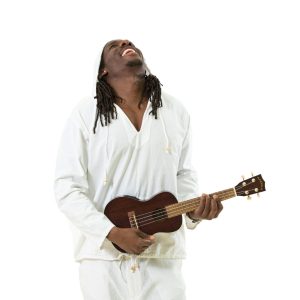 In early July, during the Montréal Jazz Fest, Wesli released his sixth album Tradisyon, an ode to his Haitian roots, and the forgotten parts of his native culture. Established in Montréal for many, many years, Wesley Louissaint has constructed 19 songs that sound like tributes to, and nostalgic fragments of, an island that has lost the means to develop its art to full potential.
In early July, during the Montréal Jazz Fest, Wesli released his sixth album Tradisyon, an ode to his Haitian roots, and the forgotten parts of his native culture. Established in Montréal for many, many years, Wesley Louissaint has constructed 19 songs that sound like tributes to, and nostalgic fragments of, an island that has lost the means to develop its art to full potential.
“Haiti has undergone a lot of cultural change, influenced by American culture,” says Wesli. “The geographical situation of the country, coupled with an economy that doesn’t work, has swallowed our roots and our Francophonie as well.”
The birth of the Tradisyon is at the heart of these roots. It draws from the depths of a nation that is a victim of its own misfortunes, and a culture that should not “die from that.” “Haiti is unable to feed its people and over the years, bad luck and natural disasters have weakened us culturally. We didn’t take what our ancestors left us seriously,” says Wesli.
The artist worked like a monk as he dug deep to safeguard every bit of endangered Haitian musical culture. “I want to inspire this vision, this motivation to re-connect Haitians with their roots, and remind them of what they used to know,” says Wesli.
On July 19, 2022, he plays these new songs during the Nuits d’Afrique Festival in Montréal. “During this show, you’ll meet the songs from my new album with even deeper roots into Haitian music,” says Wesli. “I’ll also play songs from all my other albums, so as to not ‘lose’ the people who’ve supported me for a long time.” Running until July 24, 2022, the festival showcases the deep pride of all African-rooted forms of music. “Without an event like this one, Montréal wouldn’t know all the musical culture that the rest of the world has to offer,” says Wesli.
Tradisyon will therefore be presented in its entirety, and “in real life,” so that the collective Haitian memory resonates across borders. “[Creating] this album was quite a huge process, because my starting point is lost rhythms,” says Wesli. “Haitians have lost their Creole roots. I pay homage to Azor Rasin Mapou [on ‘Samba’], to Wawa Rasin Ganga [on ‘Wawa Sé Rèl O’] and to Éric Charles as well [on ‘Konté M Rakonté’], a tenor of troubadour music. I could see that I would need more than one album to go deep into my subject,” he says with a laugh.
Wesli unflinchingly accepts the duty of transmission that has become a quasi-mantra for him. He envisions the richness of the music< and the possibility of sharing it by through the amalgamation of folk and modern sounds. Yet, to him, this is obvious. “Musical influences are naturally permeable,” he says. “There’s no musician who can make [different] music compatible. All music shares a common soul that allows it to communicate. I want to recognize and listen to this soul, so that I can share it in my own music.”
For Wesli, music thus carries within it a universal soul that has no language, nationality. or pre-determined instrument. It’s just bigger than all of that.
“I had no choice but to leave Haiti to be able to speak about her,” he says. “I’m in the ideal situation, here in Canada, to shine a light of the roots of my homeland. If I was still over there, I simply would not have the financial means to carry out this mission. Promoting our artistic values requires a certain level of financial ease. Living in Haiti is an exercise in survival. People there do not see what has been lost and needs to be safeguarded.”
He sees his life here as a unique opportunity to share his nostalgia. “Of course we feel guilty for having access to all kinds of opportunities,” he says. “We also know we wouldn’t fare any better than our peers if we were still over there. The whole idea is to take advantage of the possibilities we get, to shine a light on the place we’re from.”
Wesli’s research has led him to so many discoveries that a single album couldn’t cover it all. So his seventh album, Tradisyon 2, is slated for release in September of 2022. “I would have to make five or six albums to showcase Haitians’ values the way I see them. I want to tell the youth they should play these rhythms our ancestors have bequeathed us. In Haiti, of course, the values of servitude were taken from Africa to the colonies, but our generosity, the social aspect, the hope of our nation, and so many other things must continue to live through culture.”